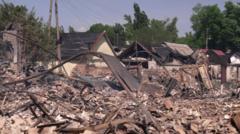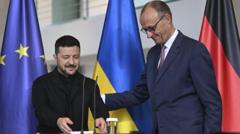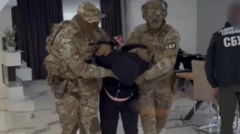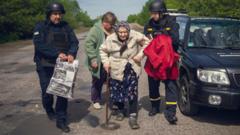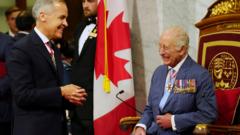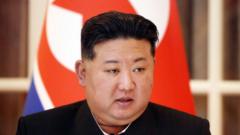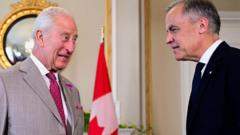In the wake of increased violence in Ukraine and Trump's remarks, tensions arise globally as allies reassess military support for Kyiv.
Kremlin Labels Trump 'Emotional' After His 'Crazy' Putin Remarks
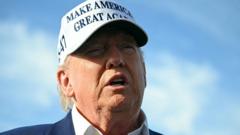
Kremlin Labels Trump 'Emotional' After His 'Crazy' Putin Remarks
Kremlin officials respond to President Trump's harsh criticism of Putin amid ongoing conflict in Ukraine.
The article text begins here:
The Kremlin criticized Donald Trump for displaying "emotional overload" following his claim that Vladimir Putin is "absolutely crazy," made in light of Russia's most extensive aerial assault on Ukraine. Trump expressed his frustration on Truth Social, after Russia's brutal attack which resulted in 13 fatalities and numerous injuries in Ukraine, declaring, "He has gone absolutely crazy. Needlessly killing a lot of people."
Dmitry Peskov, spokesperson for Putin, indicated that Trump's remarks reflect a heightened emotional state due to the ongoing crisis. Meanwhile, German Chancellor Friedrich Merz noted that Ukraine's supporters have lifted all limits on weaponry deliveries, signaling a potential increase in military assistance including Taurus missiles.
Trump's statements were ignited by Russia's largest aerial offensive since its full-scale invasion began in February 2022, involving 367 drones and missiles. During this, 10 additional casualties were reported as Russia launched another wave of drone attacks over several Ukrainian regions. Peskov asserted that these escalated air strikes were retaliation against Ukrainian attacks on Russia's "social infrastructure."
Ukrainian President Volodymyr Zelensky condemned the aerial assaults, labeling them as "an obvious political choice by Putin" to prolong the war and devastate lives. In response to the attacks, Chancellor Merz highlighted that restrictions on weapon ranges provided to Ukraine have been removed. Merz emphasized that this allows Ukraine greater capabilities, potentially enabling attacks on military targets within Russia.
Contrastingly, reports surfaced about Zelensky's planned visit to Berlin, signaling ongoing diplomatic engagements, although it remains unverified. The dynamic of support continues to evolve as Germany reconsiders its military strategy, following the precedent set by other allies like the UK and the US, who have authorized Ukraine to utilize long-range weaponry in its defense against Russia.
Trump also expressed reservations about Zelensky's rhetoric, stating that it could create additional complications for Ukraine's stance. Furthermore, he suggested potential sanctions against Russia might increase, expressing a desire for more severe measures.
Despite ongoing military engagements, the U.S. administration is pursuing either peace negotiations or reevaluating their involvement if no progress occurs. Peskov acknowledged efforts by Trump during a recent two-hour discussion about a potential ceasefire agreement, which Trump described as successful but remains an uphill battle as Ukraine and Russia navigate the complexities of the ongoing conflict.
Currently, approximately 20% of Ukrainian territory is under Russian control, highlighting the critical need for decisive actions as both sides continue to vie for strategic advantages amid the war.
The Kremlin criticized Donald Trump for displaying "emotional overload" following his claim that Vladimir Putin is "absolutely crazy," made in light of Russia's most extensive aerial assault on Ukraine. Trump expressed his frustration on Truth Social, after Russia's brutal attack which resulted in 13 fatalities and numerous injuries in Ukraine, declaring, "He has gone absolutely crazy. Needlessly killing a lot of people."
Dmitry Peskov, spokesperson for Putin, indicated that Trump's remarks reflect a heightened emotional state due to the ongoing crisis. Meanwhile, German Chancellor Friedrich Merz noted that Ukraine's supporters have lifted all limits on weaponry deliveries, signaling a potential increase in military assistance including Taurus missiles.
Trump's statements were ignited by Russia's largest aerial offensive since its full-scale invasion began in February 2022, involving 367 drones and missiles. During this, 10 additional casualties were reported as Russia launched another wave of drone attacks over several Ukrainian regions. Peskov asserted that these escalated air strikes were retaliation against Ukrainian attacks on Russia's "social infrastructure."
Ukrainian President Volodymyr Zelensky condemned the aerial assaults, labeling them as "an obvious political choice by Putin" to prolong the war and devastate lives. In response to the attacks, Chancellor Merz highlighted that restrictions on weapon ranges provided to Ukraine have been removed. Merz emphasized that this allows Ukraine greater capabilities, potentially enabling attacks on military targets within Russia.
Contrastingly, reports surfaced about Zelensky's planned visit to Berlin, signaling ongoing diplomatic engagements, although it remains unverified. The dynamic of support continues to evolve as Germany reconsiders its military strategy, following the precedent set by other allies like the UK and the US, who have authorized Ukraine to utilize long-range weaponry in its defense against Russia.
Trump also expressed reservations about Zelensky's rhetoric, stating that it could create additional complications for Ukraine's stance. Furthermore, he suggested potential sanctions against Russia might increase, expressing a desire for more severe measures.
Despite ongoing military engagements, the U.S. administration is pursuing either peace negotiations or reevaluating their involvement if no progress occurs. Peskov acknowledged efforts by Trump during a recent two-hour discussion about a potential ceasefire agreement, which Trump described as successful but remains an uphill battle as Ukraine and Russia navigate the complexities of the ongoing conflict.
Currently, approximately 20% of Ukrainian territory is under Russian control, highlighting the critical need for decisive actions as both sides continue to vie for strategic advantages amid the war.

